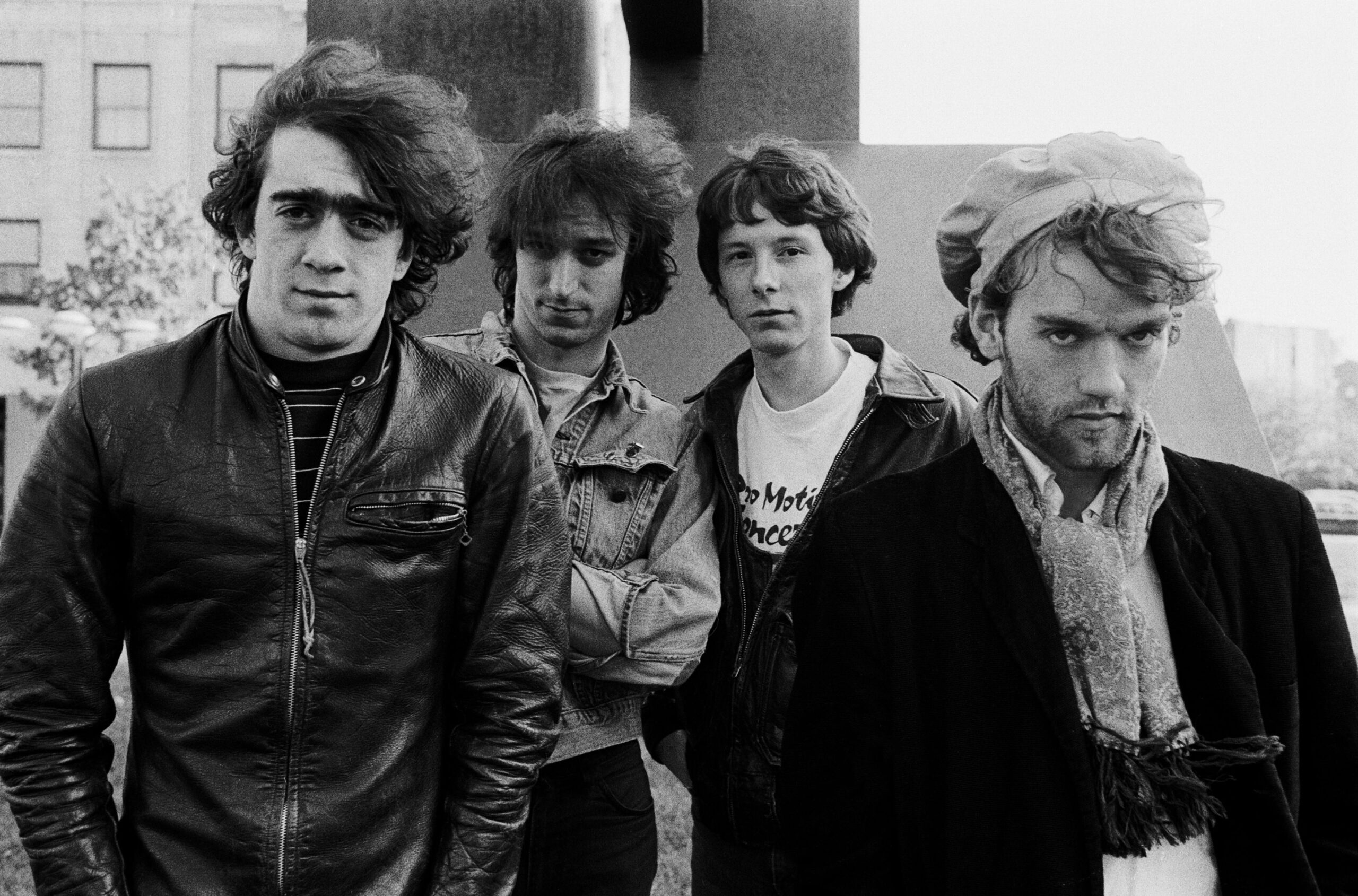
Michael Stipe met Peter Buck in an Athens, Georgia record store in January 1980, and that fortuitous moment spawned one of the defining ‘80s bands. Joined by the rhythm section of Bill Berry and Mike Mills, R.E.M. worked up a jangly yet esoteric sound – equal parts Velvet Underground and The Byrds — that quickly became their signature. Their ascent was remarkable: Each of the quartet’s first nine albums sold as much or more than the one before, turning them into household names in the ’90s.
Berry’s retirement in 1997 marked the end of R.E.M.’s classic era, but the remaining trio carried on, recording five more albums that earned mixed reviews. But when the band finally disbanded in 2011, they left behind one of alternative rock’s most important catalogs, including 15 restlessly adventurous LPs.
Their debut EP, 1982’s Chronic Town, is being reissued on Aug. 19 to celebrate its 40th anniversary — debuting as a standalone CD, with new liner notes from producer Mitch Easter. So let’s take a look back at R.E.M.’s discography, figuring out where Chronic Town belongs among the band’s full-length albums.
[embedded content][embedded content]
The last of the band’s three albums with producer Pat McCarthy has a bright, thin sound that fits poorly with Peter Buck’s conventional old-school R.E.M. riffs. Even lead single “Leaving New York,” with its comforting Out of Time vibe, is dragged down by the clunky, baffling refrain “Leaving was never my proud.” The subtle electronics do work well, however, on one of the album’s most hushed acoustic songs, the eloquent Iraq War lament “Final Straw.” In America, Around The Sun was R.E.M.’s lowest-charting album since 1986. In Europe, though, it was received more warmly — especially in Italy, where it went double-platinum and became one of the band’s most popular records. “Buck, Mills, and Stipe have settled on an uneasy mixture of textureless production and tentative stabs at past glories,” Stephen M. Deusner wrote in the Pitchfork review.
[embedded content][embedded content]
I.R.S. Records must have seen the writing on the wall that R.E.M., who was becoming too big for the label, would soon make a move to the majors. Four months before the band’s last proper indie album, Document, the label released Dead Letter Office, a compilation of B-sides and non-album tracks like “Windout,” R.E.M.’s brief contribution to the Tom Hanks sex comedy Bachelor Party. The album is a revealing, often charmingly unpolished and lighthearted look behind the curtain at R.E.M., at a time when they were considered a mysterious and even humorless band. The covers pay tribute to influences both hip (their Athens post-punk predecessors Pylon, three different Velvet Underground classics) and not-so-hip (Aerosmith, a drunken take on Roger Miller’s “King of the Road”). One of their earliest songs, “Burning Down,” was once scrapped and turned into “Ages of You,” but neither was deemed good enough for Chronic Town. As the single from Dead Letter Office, however, “Ages of You” got its moment in the sun and became a minor hit; and “Voice of Harold” is an entertaining curio, an alternate take of “7 Chinese Bros.” featuring Michael Stipe reading the liner notes of a gospel album over the song.
Buy Dead Letter Office on Amazon.
[embedded content][embedded content]
Every generation experiences the disappointment of hearing a once-great artist in decline. But back in the compact disc era, that disappointment usually cost about $13. And even after I’d patiently let Up grow on me, I considered R.E.M.’s first 21st century LP an enormous letdown. The beautiful piano-driven opener “The Lifting” remains one of their best post-Berry tracks, but there’s a steep dropoff from there, tempered only by the familiar jangly sound of lead single “Imitation of Life.” Stipe was enunciating more clearly than ever, but with the mystery gone, his lyrics started to feel banal, if not dull.
[embedded content][embedded content]
It’s a grand tradition of alternative rock: the fan-favorite debut EP that sets the stage for later triumphs, often mentioned in the same breath as their best full-lengths. Pixies, Fugazi, Pavement, Godspeed You! Black Emperor, and TV On The Radio all have one, but Chronic Town remains the granddaddy of them all. These five songs illustrate how fast they were in the early days — the opener “Wolves, Lower” is far speedier than the average post-Murmur track. Still, the version on Chronic Town is actually the slower of the two takes recorded for the EP. And “Gardening At Night” shows seeds of the pop smarts that would take the band far over the next decade. The band’s first record came in second place behind T-Bone Burnett in the EP section of The Village Voice’s 1982 Pazz & Jop poll, foreshadowing American rock critics’ long love affair with R.E.M.
[embedded content][embedded content]
R.E.M. didn’t announce their breakup until six months after releasing Collapse Into Now, their 15th proper album. But Buck, Stipe, and Mills decided before the sessions that it would be their last, putting everything they had into, as Mills told The AV Club, “going out on a high note.” Collapse was received with the same weary indifference that attended their other post-Bill Berry albums. But in retrospect, it feels satisfying, reuniting the band with producer Jacknife Lee for a more measured and variation on the Accelerate’s hard-charging rock. They even conjure the Out Of Time era effectively on “Oh My Heart” (recently used to great effect on the Hulu series The Bear). Stipe’s lyrics are as clunky as they’ve ever been on “Every Day Is Yours To Win” and lead single “It Happened Today,” but the album’s overt themes of living in the moment and seizing the day can be poignant.
Buy Collapse Into Now on Amazon.
[embedded content][embedded content]
Taking a five-year break from touring and recording a pair of meditative, largely acoustic albums had, against all conventional wisdom, made R.E.M. more popular than ever. But in 1994, they really leaned into the whole “rock star” thing, making a loud, uptempo record and promoting it heavily with magazine covers and a sprawling world tour. Unfortunately, the entire Monster album cycle was plagued by health problems – Berry collapsed with a brain aneurysm during a concert, and Stipe and Mike Mills both underwent minor surgeries. And the sound of the album, with Stipe’s voice buried under layers of Buck’s tremolo-caked guitar, made for a difficult adjustment. Monster, like Out of Time and Automatic For the People, went quadruple-platinum in the U.S., and singles like the massively catchy “What’s the Frequency, Kenneth?” blanketed rock radio airwaves. But anecdotal evidence, particularly the many copies of Monster littering used-CD bins, suggested that many fans had buyer’s remorse, and R.E.M. never sold in those big numbers again. Monster has its share of fans, and a 2019 reissue brought a new wave of positive reevaluation, but it remains the most divisive record in the R.E.M. catalog.
Purchase Monster on Rough Trade.
[embedded content][embedded content]
Fourteen years after Monster, R.E.M. once again made a loud, bombastic “return to rock” record. But this time, they were pivoting away from several far less popular electronic-tinged albums, and the stakes felt lower. And Accelerate hews closer to the breakneck pace of the band’s earliest songs on standouts like “Living Well Is The Best Revenge” and “Horse to Water.” Former Ministry drummer Bill Rieflin, who passed away in 2020, does an admirable job of restoring some of the momentum and urgency of the Berry era, while the age in Stipe’s voice adds a satisfying growl to his performances. “Here’s a band rediscovering the shadings and strengths of rock’n’roll elementalism,” Josh Modell wrote in the SPIN review.
10. Green (1988)
[embedded content][embedded content]
R.E.M. wasn’t the first band from the ‘80s American indie rock boom to make the major label leap. But while peers like The Replacements and Husker Du had already taken the plunge with mixed results, R.E.M. were the golden boys who made it look easy. They secured creative control in their Warner Bros. contract, continuing to ascend commercially and collect glowing reviews, meanwhile becoming role models for the next indie-going-major wave. In retrospect, R.E.M.’s second album with producer Scott Litt feels a little like a sequel to Document, with even more brash crossover moves like “Stand” and an opener with the tongue-in-cheek title “Pop Song 89.” But “Hairshirt” and the gorgeous, mandolin-driven “You Are the Everything” foreshadow the acoustic era that would take R.E.M. to greater heights on their next album. “There’s a raw but sharply honed edge to Peter Buck’s guitar attack, and the band adds bite with new-found percussive effects,” wrote Mike Boehm in the L.A. Times.
9. Up (1998)
[embedded content][embedded content]
Up’s biggest fan may be the guy whose absence defines it — the newly retired Berry raved happily that the first album R.E.M. made without him was one of their best. R.E.M. did bring in some session drummers for the album, but Joey Waronker (from Beck’s band) and Barrett Martin (of the Screaming Trees and Buck’s side project Tuatara) tread lightly; and the ticking drum machines of “Hope” and the hushed opener “Airportman” offer an atmosphere unlike any other R.E.M. album. Up certainly could’ve been more judiciously edited — it’s one minute shorter than their longest album, New Adventures in Hi-Fi, which justifies its running time with far more variety and energy. But it’s full of subtle pleasures and some of Stipe’s loveliest singing, from the groovy “Lotus” to the Brian Wilson homage “At My Most Beautiful.”
[embedded content][embedded content]
In retrospect, the once-constant comparisons between R.E.M. and U2 feel reductive and say little about either band’s individual quirks. But for a time, their careers seemed to move in perfect parallel: the steady rise, the big breakthrough fifth album in 1987, followed by a bold reinvention on the seventh album in 1991. Where U2 reintroduced themselves in the ‘90s with ironic detachment and hip danceable rhythms on Achtung Baby, R.E.M. went in the opposite direction with the rustic acoustic sound of Out of Time, both huge successes. “Losing My Religion” may very well be the R.E.M. song, the last one that anyone remembers decades or centuries from now. But even Out of Time’s campy outliers “Shiny Happy People” and “Radio Song” are, like it or not, pretty great. If the album isn’t as impressive now as it was when, it’s because R.E.M. made an even better record from the same muted palette just a year later.
[embedded content][embedded content]
The only R.E.M. album recorded entirely outside the U.S. is, ironically, also the one most deeply steeped in Southern Gothic themes. The gloominess of London in February may have seeped into the sound: Starting with Buck’s prickly harmonics on opener “Feeling Gravity’s Pull,” R.E.M.’s third album announces itself as a change of pace, one of their most lyrically and musically ambitious. The incongruously funky lead single “Can’t Get There From Here” hints at the band’s playful future crossover moves, but the rest of Fables is moody, uncompromising, and often beautiful.
Buy Fables of the Reconstruction on Amazon.
[embedded content][embedded content]
R.E.M. have six platinum or multi-platinum albums, and it’s no coincidence that Scott Litt helmed them all. A New York native who’d produced R.E.M. tourmates The dB’s plus Katrina and the Waves’ “Walking on Sunshine,” Litt gave Document a bigger, brighter sound that launched “The One I Love” and “It’s the End of the World as We Know It (And I Feel Fine)” onto the pop charts. Even a cover of “Strange” from Wire’s post-punk classic Pink Flag sounds downright arena-ready. Robert Christgau, assigning R.E.M. an A grade for the first time in their career, gave Document high praise in The Village Voice: “These dreamsongs are nightmares of a world in flames, the kind you remember in all their scary inconsistency because you woke up sweating in the middle. How it will all end I couldn’t say, but it’s a healthy sign that their discovery of the outside world has sharpened their sense of humor along with everything else.”
[embedded content][embedded content]
In 1996, it seemed like every A-list alt-rock band took a sales dive as grunge’s boom years subsided. But New Adventures in Hi-Fi is a magnificent last hurrah for R.E.M.’s original lineup and their hitmaking Litt era. A sprawling album that was written during the Monster tour — and recorded during shows, soundchecks, and in dressing rooms before getting completed in the studio — it sounds like an omnibus of their past, present, and future. “Departure” could have been on Document, while “New Test Leper” revisits the lush sound of Automatic. The swaggering glam-rocker “Wake Up Bomb” singlehandedly beats Monster at its own game, and the novel textures of “Leave” and “How the West Was Won and Where It Got Us” tease the band’s future electronic experiments.
Buy New Adventures in Hi-Fi on Rough Trade.
[embedded content][embedded content]
Lifes Rich Pageant marks the point where Stipe started to sound like the voice of a generation, enunciating his words more clearly and singing with more emotion and conviction. His lyrics could still be a little esoteric — you don’t really know what “I believe in coyotes and time as an abstract” means, but it somehow feels inspiring coming from him. The album’s unlisted final track is “Superman,” a cover of a 1969 obscurity by the Texas band The Clique — and it became a rock radio hit for R.E.M., an early instance of Mills’ voice taking center stage.
Purchase Lifes Rich Pageant on Amazon.
[embedded content][embedded content]
R.E.M. played several of these tracks live before Murmur, their 1983 debut. But those songs included “So. Central Rain” and “Pretty Persuasion,” which remained stage cornerstones for three decades, so Reckoning is anything but a leftovers collection. “7 Chinese Bros.” epitomized the cryptic, allegorical nature of Stipe’s early lyrics, but decades later he’d reveal how autobiographical it was: “[It’s about] breaking up a couple, and then dating both of them, a man and a woman, which is a terrible thing to do, but I was young and stupid.” And the band’s first song primarily authored by Mills, “(Don’t Go Back To) Rockville,” found the Georgia quartet flirting with country music, in their own way, for the first time.
[embedded content][embedded content]
Out of Time was meant to be a one-off. They planned to follow by plugging the amps back in and making a record album — and deciding not to tour meant they could get started right away. But R.E.M. continued to follow their instincts, as they always had, and wound up with an even more gorgeously textured album filled with acoustic guitars, mandolins, pianos, bouzouki, melodica, violins, and melodica. “Man On the Moon” became the full flowering of the country twang they’d intermittently toyed with since Reckoning, and “Nightswimming” and “Sweetness Follows” rank among the most gorgeous music R.E.M. ever put to tape. As counterprogramming to the loud Lollapalooza zeitgeist, Automatic For The People was wildly successful, selling 18 million copies globally and earning a Grammy nomination for Album of the Year (but losing out to the Bodyguard soundtrack).
Buy Automatic for the People here.
[embedded content][embedded content]
Sonic Youth, Madonna, Metallica, Violent Femmes, Anita Baker, Minor Threat, Whodini, Cyndi Lauper, and Tears For Fears all released their debut LPs in 1983. But arguably no one arrived more fully formed as R.E.M., who offered a new idea of Southern rock that had little to do with Lynyrd Skynyrd on eerie, elliptical, and addictive songs like “Pilgrimage” and “Talk About the Passion.” The band played over 120 shows, broke big on college radio, and made their television debut on Late Night with David Letterman — and Murmur began traveling from dorm room to dorm room, from cool older sibling to younger sibling. “This band’s darkness is shot through with bright light. Vocalist Michael Stipe’s nasal snarl, Mike Mills’ rumbling bass and Bill Berry’s often sharp, slashing drums cast a cloudy, postpunk aura that is lightened by Peter Buck’s folk-flavored guitar playing,” wrote Steve Pond in the four-star Rolling Stone review.
Purchase Murmur on Rough Trade.









Tagged: Lists, r.e.m.